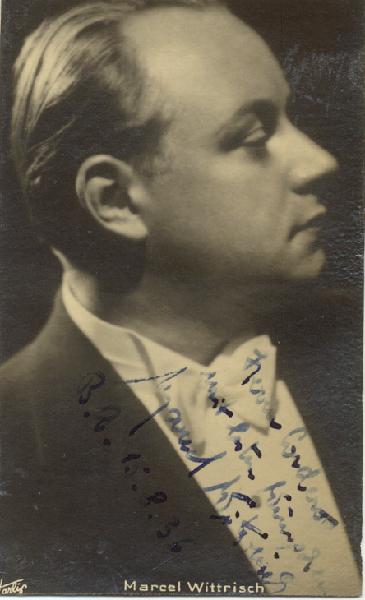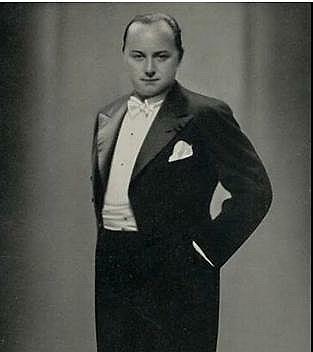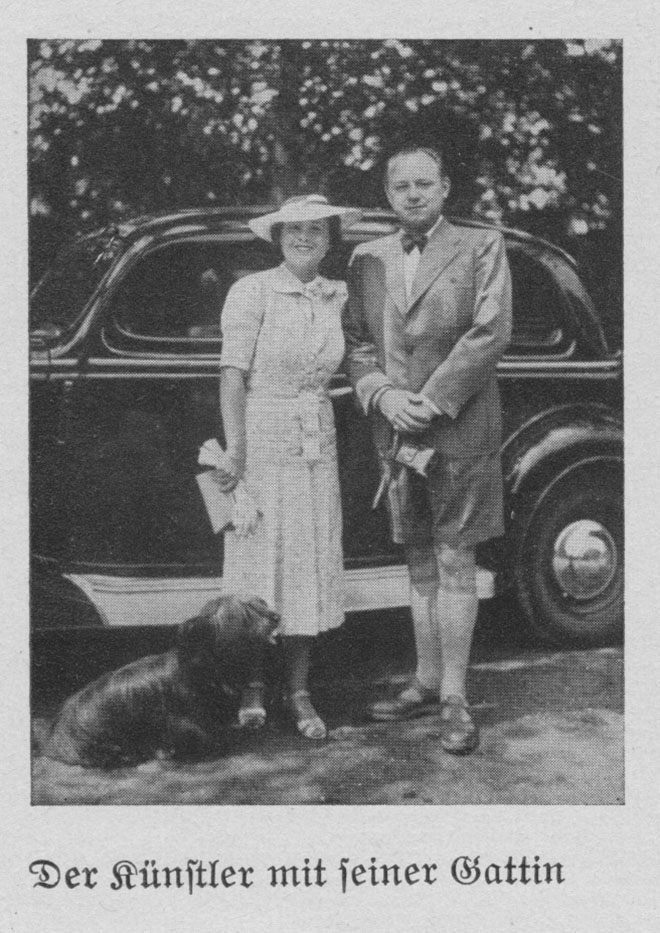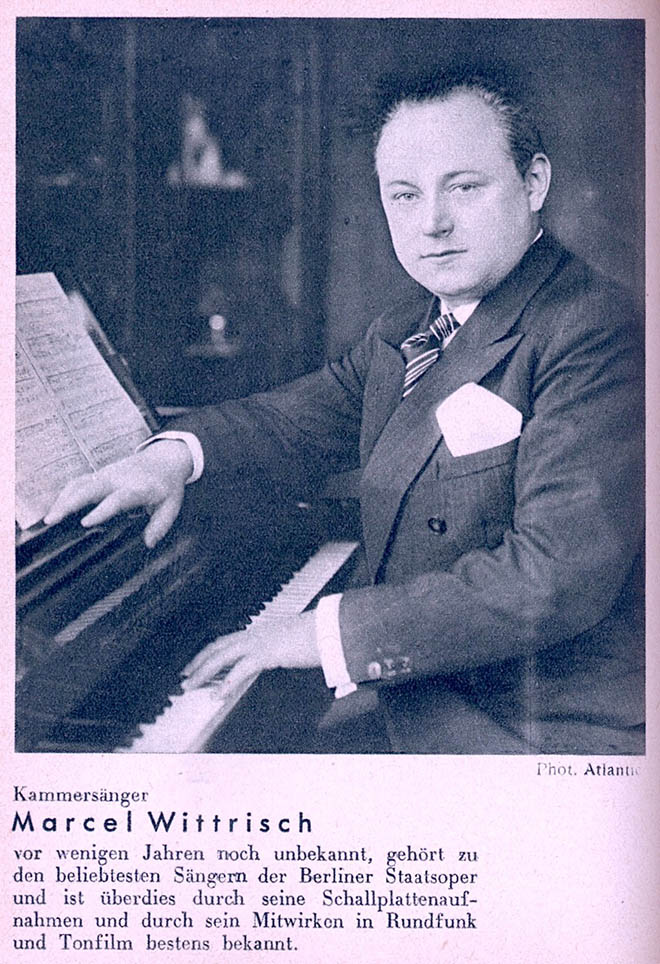Marcel Wittrisch
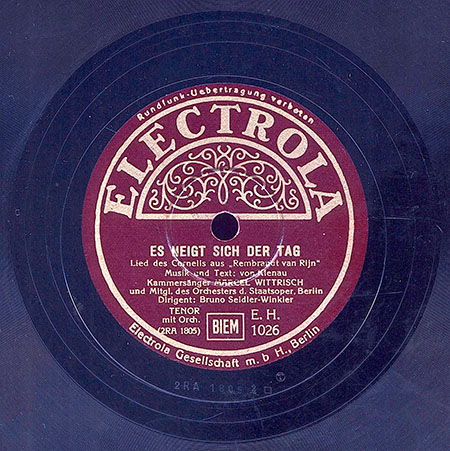
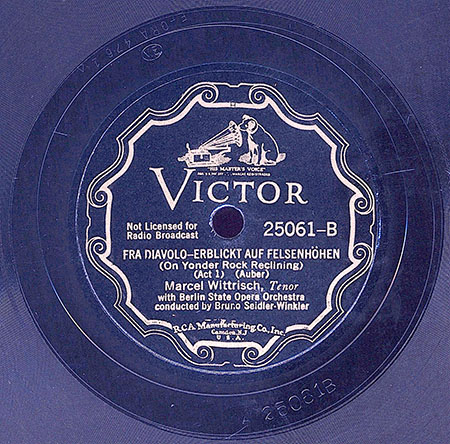
Nobody ever sang mezza voce as perfectly as Wittrisch; few singers were able to color every note as
beautifully as he did; and he had a remarkable top. But he learned all that on the job; in his earliest recordings, the voice
didn't come forward, was relatively dull, and the top was nothing to write home about. So he acquired the qualities that made
him stand out only when he had already been singing for a few years; and on bad days, he fell back into his earlier habits,
that's why some of the recordings also from his heyday are surprisingly disappointing (the above Di quella pira is an
example). But on his good days, he had certainly little competition.
His family lived in Belgium, where his father was a fur merchant; after WWI, they had to leave the country and settled in
Leipzig. Marcel Wittrisch studied in
Leipzig, Munich (with Jacques Stückgold) and Milano, and made his debut as Konrad in Marschner's Hans Heiling in
1925 in Halle an der Saale. Via Braunschweig (1926–29), he came to the Staatsoper Berlin, where he had his period of
glory until 1944. He was a guest at Covent Garden (1931), La Scala, the Vienna Staatsoper, Teatro Colón,
Théâtre de la Monnaie, in Amsterdam, Munich, Rio de Janeiro and Bayreuth (Lohengrin 1937). In Berlin, he was also
extremely popular on the radio.
He continued his career after WWII, but it was not quite the same; the good times were over for him. I'm sure that was for
psychological reasons; he had been one of the most zealous operatic supporters of the Nazi regime (resounding evidence
can be heard above, one of the most embarassing Nazi propaganda songs ever – the Hitler Hymn by Leopold von
Schenkendorf: "May God be with our Führer, may God bless his hand"). In the first years after
1945, he sang primarily in concert and in operetta. From 1949 to his death, he was a member of the Stuttgart
opera; in 1951, he sang at the Paris Opéra, and he also returned to Vienna (1950–52).
The first list gives Wittrisch's Staatsoper Berlin repertory, with the date of the first performance. An asterisk indicates that he had already sung the role before coming to Berlin: Die schöne Galathée – 1930 Il re (by Giordano) – 27 January 1930 Le preziose ridicole (by Lattuada) – 27 January 1930 Spiel oder Ernst (by Reznicek) – 12 January 1931 La vedova scaltra (by Wolf-Ferrari) – 20 January 1931 Manon Lescaut – 13 April 1931 Der Pfeifertag (by Schillings) – 12 September 1931 Wiener Blut – 4 February 1932 Les huguenots – 26 February 1932 *La bohème – 17 June 1932 Der Liebesverbot – 20 January 1933 *Die Zauberflöte – 3 March 1933 Eine Nacht in Venedig – 13 March 1933 Les vêpres siciliennes – 26 March 1933 *Lohengrin – 22 May 1933 Carmen – 20 September 1933 Arabella – 12 October 1933 Der Kreidekreis (by Zemlinsky) – 23 January 1934 Donna Diana – 17 February 1934 Der Freischütz – 20 March 1934 Cavalleria rusticana – 13 April 1934 Der Rosenkavalier – 5 May 1934 Intermezzo – 31 May 1934 Ariadne auf Naxos – 3 June 1934 Les pêcheurs de perles – 21 June 1934 Ernani – 12 December 1934 Der Wildschütz – 23 May 1935 *Martha – 1935 Madama Butterfly – 6 November 1935 Turandot – 8 December 1935 La traviata – 1935 La forza del destino – 1935 La fiamma (by Respighi) – 1936 *Der fliegende Holländer (Steuermann) – 8 October 1936 Halka – 15 November 1936 Rembrandt von Rijn (by Klenau) – 23 January 1937 (world premiere) Prodaná nevěsta (Jeník)- 16 March 1937 Mignon – 16 October 1937 Die Bürger von Calais (by Wagner-Régeny) – 28 January 1938 (world premiere) Palestrina – 22 April 1939 La dama boba (by Wolf-Ferrari) – 22 June 1939 Tosca – 3 October 1939 Mona Lisa – 3 November 1939 Rigoletto – 18 January 1940 Elektra – 18 February 1940 Ero s onoga svijeta – 29 March 1940 The second list gives those of Wittrisch's role debuts that he did not make at the Berlin Staatsoper: Hans Heiling – Halle an der Saale, 1 January 1925 Lohengrin – Halle an der Saale, 1925/26 Martha – Braunschweig, 1926–29 Der fliegende Holländer (Steuermann) – Braunschweig, 1926–29 La bohème – Braunschweig, 1926–29 Die Zauberflöte – Braunschweig, 1926–29 Její pastorkyňa/Jenůfa – Braunschweig, 1926–29 Le cadi dupé (by Gluck) – Braunschweig, 1926–29 Paganini – Braunschweig, 1926–29 Der Bettelstudent – Braunschweig, 1926–29 Die Fledermaus (Eisenstein) – London, Covent Garden, May 1931 Die Walküre – Stuttgart, 1949–1955 Parsifal – Stuttgart, 1949–1955 Iphigénie en Tauride – Stuttgart, 1949–1955 Salome (Narraboth) – Paris, Opéra, 1951 Der Zigeunerbaron – Staatsoper Wien, 1951 Reference: The Record Collector, October–December 1995 Reference: Stimmen die um die Welt gingen, no. 30/December 1990 I would like to thank Daniele Godor for the recording (Gott sei mit unserm Führer). I would like to thank Thomas Silverbörg for the recordings (Pour un baiser, Evangelimann) and the picture (bottom). Reference for some of the biographical information: Kutsch & Riemens |
